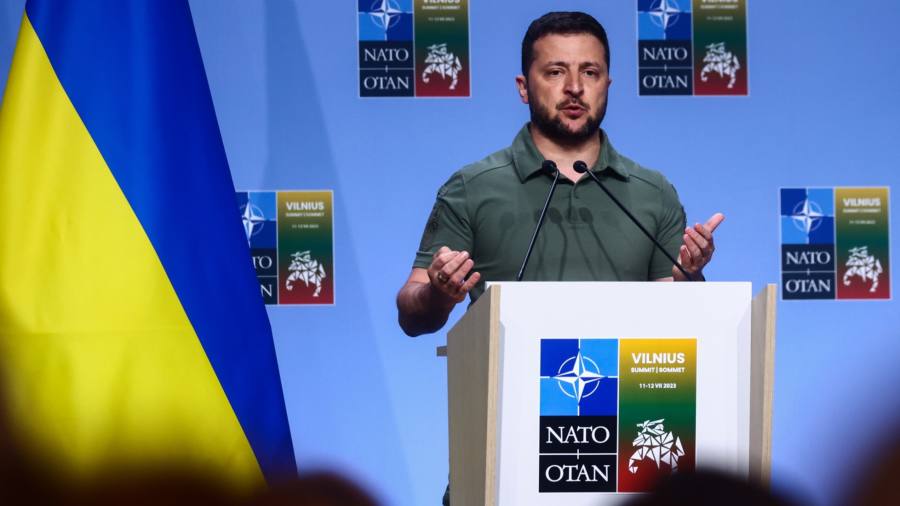Receive free Nato updates
We’ll send you a myFT Daily Digest email rounding up the latest Nato news every morning.
The author is a member of the House of Lords, chairman of geopolitical advisory for Rothschild & Co and a former UK national security adviser
Last week’s Nato summit had three tasks: consolidate support for Ukraine; strengthen the alliance’s military capabilities; and deepen ties with Pacific allies in facing the common challenge of China. Did it meet expectations?
Russia’s invasion of Ukraine has, paradoxically, strengthened Nato. Allies have recommitted to invest at least 2 per cent of gross domestic product on defence. The accession of Finland and Sweden, two significant military powers (and EU members), to the alliance will strengthen Nato’s northern axis, and the — still fragile — rapprochement with Turkey’s President Erdoğan will do the same for its southern flank.
When I was national security adviser, I was often asked to name the most serious threat. I always demurred. To draw on a sporting analogy, we have to play what is in front of us.
Today’s threat is Vladimir Putin’s Russia. Yesterday’s was terrorism and trafficking emerging from state failure. Tomorrow’s inevitable challenge is China, particularly as climate change opens Arctic waters and brings Nato and China into proximity in the high north. What next? State failure in post-Putin Russia? Uncontrolled artificial intelligence? Resource wars in Africa? These and more are possible, as are unknown unknowns. The western alliance, with Nato at its core, must be ready for anything.
Alliance members must invest in their defence industries so that production of equipment and ordnance can be surged when a crisis arises, and ensure that increasing defence expenditure is invested in real capabilities, not eye-catching prestige or nostalgia programmes.
Nato’s nuclear doctrine also needs a refresh: we should signal to Russia that any use of nuclear weapons anywhere, not just in Nato territory, could be met with force. Nuclear deterrence is terrifying, but more terrifying is an isolated, desperate autocrat misjudging our resolve and pressing the button.
The other key lesson as a result of Russia’s invasion of Ukraine concerns Nato’s engagement beyond the Euro-Atlantic. Climate change, the tech revolution, ageing populations, migration, the resurgence of the petrodollar, and competition for raw materials critical to the green transition and modern economy are already having a geopolitical — as well as socio-economic — impact.
Much of the world is rediscovering the appeal of non-alignment. So we should reinvest in our relationships with countries such as Brazil, India, South Africa and in the Gulf. Although many countries fear aggressive neighbours and few support Putin’s invasion, they also complain of western arrogance and double standards. Old friends we have neglected welcome China’s investment and its boundless appetite for their raw materials.
More private western investment in the global south could be unleashed if underwritten by political investment in sustained and stable relationships. And the welcome, if still tentative, efforts by Washington and Beijing to stabilise their relationship will be more resilient if underpinned by a common approach with the US’s European and Pacific allies. The Vilnius meeting was a useful step forward in that endeavour.
But the summit fell short on Ukraine. Given the G7 pledges of support, diplomats will doubtless be arguing already that better management of Ukrainian expectations in the face of American and German caution over the road map to Nato membership would have enabled the summit to be seen as a step forward rather than a setback.
Reeling from the humiliation of the Wagner mutiny, Putin, instead of feeling the screw turned, will have seen a glimmer of opportunity in the Nato frictions over this and scratchiness about Ukrainian gratitude. Nor will President Biden’s guarantee of strategic patience worry him much, after the scuttle from Afghanistan. If his forces can dig in and stall the Ukrainian counteroffensive, he will hope that pressure will build on President Volodymyr Zelenskyy to talk as well as fight.
Putin will already be comforted by the plans of some of US Republicans to restrict support to Ukraine and, presumably, hopes that the 2024 election will produce a president ready to concede land for peace. President Zelenskyy, however, will not cede Ukrainian territory after such a fierce struggle for national survival. And Putin’s disregard for the Minsk agreements between Russia and Ukraine, signed in September 2014, demonstrates that he would regard any ceasefire deal as just a tactical pause to regroup.
So Nato should not relax after the Vilnius summit. Instead, in his last year as secretary-general, Jens Stoltenberg should secure three commitments for Ukraine: more weapons now to support this year’s counteroffensive; long-term support for developing the advanced capabilities to repel and thus deter future Russian aggression; and that guaranteed road map to Nato membership.
As governments across the world wrestle with climate change, the tech revolution, ageing populations, migration and the retreat from globalisation, how the western alliance meets this challenge will determine how others align themselves in this era of strategic competition and thus who writes the history of the 21st century. It is a decisive period.
This article is part of a special report on National Security to be published on July 19
Read the full article here




